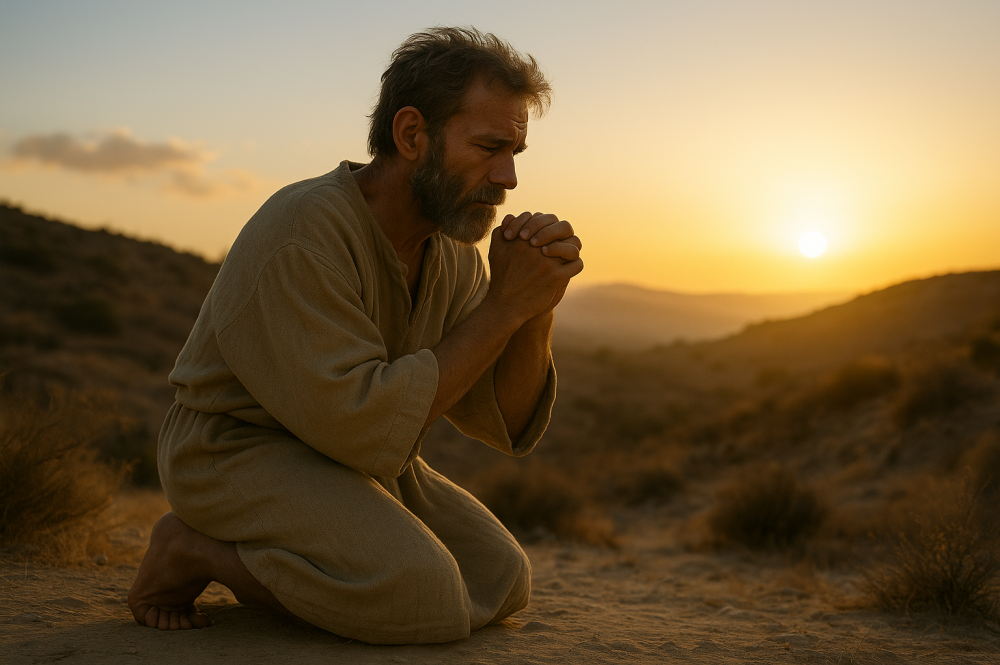
In a culture that often treats salvation as a one-time event—a quick prayer, a raised hand, a moment of decision—Paul’s words in 1 Corinthians 9:27 come as a wake-up call.
“But I pommel my body and subdue it, lest after preaching to others I myself should be disqualified.” (RSV-CE)
Why would Paul, an apostle chosen by Christ Himself, worry about being disqualified? Isn’t he already “saved”? And what exactly is this prize he’s so determined to win?
Let’s walk through this passage step-by-step. We’ll unpack the context, the athletic metaphor, and what it tells us about grace, effort, and the real risk of falling away.
Paul’s Audience: Corinth’s Culture and the Christian Conflict

Paul is writing to the Corinthians, a young Christian community surrounded by wealth, paganism, and sexual immorality. Corinth was a bustling port city in Greece, famous for its commerce and notorious for its vice.
The believers there were struggling. They had divisions, moral lapses, and a skewed sense of spiritual superiority. Some even questioned whether Paul had the right to call himself an apostle.
Paul’s letter tackles these issues head-on. In 1 Corinthians 9, he defends his role and explains how he gave up certain rights (like being paid for preaching) so that the Gospel could reach more people. He uses athletic imagery that would have been familiar to them from the Isthmian Games, held not far from Corinth.
This brings us to verses 24–27, where he compares the Christian life to a race.
The Race and the Prize: What Are We Running For?
“Do you not know that in a race all the runners compete, but only one receives the prize? So run that you may obtain it.”
(1 Corinthians 9:24)
Paul’s not talking about a footrace for entertainment. He’s using the race as an image for the Christian life—and the prize is no less than eternal life.
“They do it to receive a perishable wreath, but we an imperishable.” (v. 25)

Athletes in those games trained with strict discipline for months, all for a crown of olive leaves that would soon wither. Paul contrasts that with the imperishable crown believers seek—what the New Testament elsewhere calls the “crown of righteousness” (2 Tim 4:8) or the “crown of life” (James 1:12).
This isn’t a mere metaphor for blessings. Paul is talking about salvation itself—life with God, forever.
“What I Proclaim”: Paul’s Mission and Message
In verse 27, Paul says he fears being disqualified even after preaching to others. The word used—“preaching”—translates the Greek kērussō, which refers to proclaiming or heralding the Gospel.
Paul isn’t talking about being disqualified from a reward like a ribbon. He’s saying that even though he spends his life proclaiming the Gospel of salvation, he still disciplines himself so that he too will finish the race and receive the crown.
This is not false humility. Paul really means it. He doesn’t consider his salvation a “done deal.”

“Disqualified”: Can Paul Really Lose Salvation?
The Greek word for “disqualified” here is ἀδόκιμος (adokimos), meaning “unapproved,” “rejected,” or “found unfit after testing.” In other New Testament contexts, it describes being cast away or condemned (see 2 Corinthians 13:5–7).
Paul doesn’t say, “I might lose some heavenly bonus points.” He’s talking about being cut off from the very thing he urges others to pursue.
That flies in the face of the popular claim that salvation is guaranteed after a one-time declaration of faith. Paul knew better. He had seen believers fall away. He also knew that God’s grace doesn’t eliminate human freedom—it empowers it, but never forces it.
Why the Body? Self-Mastery and Grace
“I pommel my body and subdue it…” (v. 27)
Paul is not talking about self-harm or mere willpower. He’s talking about mastering the desires of the flesh—not letting the body or its appetites dominate the soul.
He uses athletic training as an analogy. An athlete disciplines their body to win a crown. In the same way, Paul disciplines himself to stay focused, faithful, and fruitful.
This doesn’t mean he earns salvation by effort alone. Catholic teaching is clear: grace comes first. But it also insists—along with Scripture—that we must cooperate with grace through good works, repentance, and perseverance.
As Paul says in Philippians 2:12–13:
“Work out your own salvation with fear and trembling; for God is at work in you, both to will and to work for his good pleasure.”
But I Thought Works Flow Naturally From Faith?
Some Protestant traditions argue that if you’re truly saved, good works will just flow out of you automatically, like fruit from a healthy tree. In this view, if someone doesn’t produce good works, it only proves they were never saved to begin with.
But Paul doesn’t say that. He actively strives to remain faithful. He doesn’t rely on momentum. He urges others to “run that you may obtain [the prize].”
In the Catholic understanding, grace makes the race possible, but not automatic. Our cooperation matters. That’s why Paul says he disciplines himself—so that he doesn’t fall short.
Salvation Requires Perseverance
Paul’s warning lines up with Jesus’ own teaching:
“He who endures to the end will be saved.” (Matthew 24:13)
“Abide in me… If anyone does not abide in me, he is cast forth as a branch and withers.” (John 15:4–6)
Faith begins our journey, but faithfulness brings it to fulfillment. Salvation isn’t a spiritual “participation trophy.” It’s a reward for those who finish the race, not just those who start it.
Final Thoughts: Run to Win

Paul wasn’t insecure about God’s love. He knew God’s mercy and trusted in Christ. But he also knew the stakes. He did not presume. He lived what he preached: a life of trust, discipline, and perseverance.
1 Corinthians 9:27 isn’t just a personal reflection—it’s a warning and a challenge to every Christian.
Don’t just watch the race. Run it.
Don’t assume the crown. Strive for it.
Don’t rest on a moment of faith. Live it out every day.
Because in the end, we’re not chasing a crown of leaves. We’re chasing eternal life.
Want to go deeper?
Check out these related passages:
- Philippians 3:12–14 – “I press on toward the goal…”
- 2 Timothy 4:7–8 – Paul at the end of his race
- Hebrews 12:1–2 – Run with endurance

Very interesting article, and if you break this down, it is like anything in life. Nothing comes easy, and even when you get something, you need to work to keep it.
The same goes for salvation. It is no use repenting one day and then carrying on sinning the next. You need to work on yourself to keep yourself from getting into more trouble and keeping your life clean. I think this is very difficult for all of us to do and it take real self discipline and courage.
Thank you—beautifully said. You’re exactly right: just like anything worth having, salvation calls for perseverance, not passivity. Repentance isn’t a one-time checkbox—it’s a turning of the heart that needs daily follow-through. And yes, staying on the narrow path takes real courage and discipline, especially in a world full of distractions and temptations. But the good news is, we’re not running this race alone. God gives us the grace we need to keep going, one step at a time.
Thank you for this insightful exploration of 1 Corinthians 9:27. Your emphasis on the necessity of self-discipline in the Christian journey resonates deeply. It’s a poignant reminder that our faith is not a passive experience but an active pursuit, requiring intentional effort and perseverance.
In today’s culture, where instant gratification is often celebrated, how can we, as believers, cultivate the kind of spiritual discipline Paul exemplifies? Additionally, what practical steps can we take to ensure we’re not merely running aimlessly but are purposefully striving toward the imperishable crown?
Your article challenges us to reflect on our spiritual walk and encourages a commitment to live out our faith with purpose and dedication. Thank you for shedding light on this vital aspect of our Christian life.
Thank you for your kind words and for asking those important questions. Paul’s example goes against the grain of our instant-gratification culture, and that’s why his message is so important for us today.
In practical terms, cultivating that kind of discipline starts with the small, steady habits that reorient our hearts toward Christ: daily Scripture, meaningful prayer, and intentional moments of self-denial that remind us who we belong to. These practices train us, slowly but surely, to choose the long view of eternity over the short rush of comfort.
And to make sure we’re not “running aimlessly,” it helps to keep the goal in front of us. Regularly examining our day, asking where we lived for Christ and where we drifted, keeps our direction clear. Staying rooted in the sacramental life of the Church and in a faithful community also anchors us so we don’t run the race alone or without focus.
None of this is about earning salvation—it’s about shaping our lives so we actually live the faith we profess and keep our eyes on that imperishable crown. Thank you again for engaging so deeply with the passage!